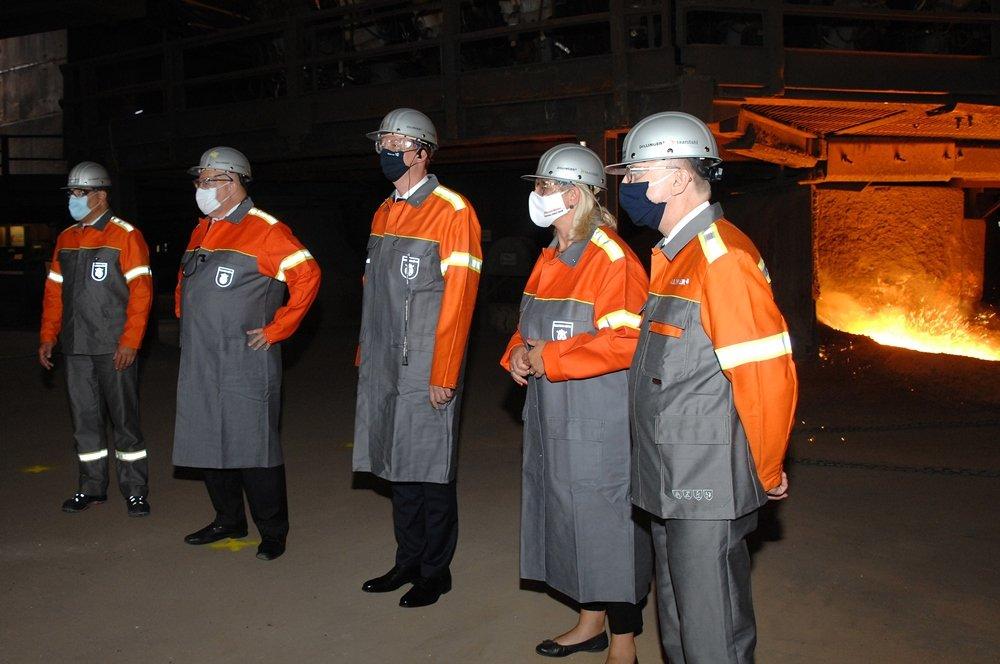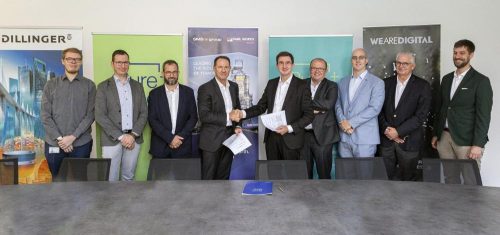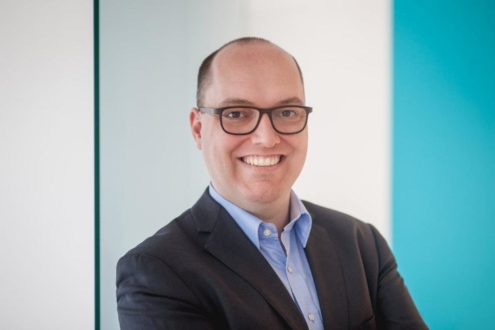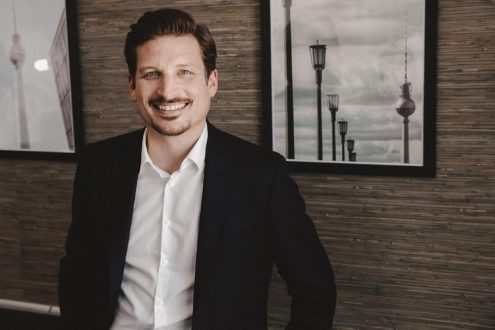
It’s all systems go for the green transformation
Peter Altmaier, German Minister of Economics and Energy, visited the Dillingen site today together with Saarland’s Minister-President Tobias Hans and Saarland’s Minister of Economics and Energy Anke Rehlinger, to gather information about the plant and where the companies stand in the upcoming transformation process.
Ready for the transformation process
"We are ready for the transformation to green steel," says Tim Hartmann, Chairman of the Board of Saarstahl and Dillinger. "This investment confirms: Saarstahl and Dillinger are ready to take the next big steps on the way to producing green steel."
The new plant in Dillingen is the first in Germany that uses hydrogen as a reducing agent in the blast furnace in normal operation. This is accomplished by injecting hydrogen-rich coke gas. "We can further reduce our carbon emissions on the basis of this technology while gaining important experience in using hydrogen in steel production," explained Martin Baues, Member of the Board of Directors for Technology. "The plant will enable us in the next step to use pure hydrogen in both blast furnaces."
The use of hydrogen in steel production is a key factor in reducing carbon emissions. The coke gas injection system is an important step toward producing green steel and minimizing the use of resources. Carbon emissions from the blast furnace can be reduced by replacing the carbon in the blast furnace with hydrogen as a reducing agent and energy source.
This means conditions are now in place for future operation of the blast furnaces, as far as technically possible, with green hydrogen. The precondition for this as well as for the complete conversion of our steel production to hydrogen – based then on other technologies like electric furnaces and hydrogen-based direct reduction plants – is the future availability in Saarland of green hydrogen in sufficient quantities and at competitive conditions.
Responsibility for the future
"Dillinger and Saarstahl adopted a future-focused strategy last year with the motto ‚proactive, carbon-free, efficient‘. In the course of this, we also defined the specific steps for the complete conversion of our production to green steel," Tim Hartmann added. "We are ready and eagerly awaiting the starting signal from the legislators. For the next major steps, reliable political framework conditions must be ensured in three areas: a fair foreign trade framework, support during the transformation and sufficient green energy at competitive prices. Our ambitious goal is to reduce carbon emissions by 40 percent by 2035. The political framework for this must be created during this year. The German government’s Steel Action Plan and the current German presidency of the EU Council provide the framework for this. Berlin and Brussels will have to demonstrate their commitment to the Green Deal by the end of this year. Time is running out!"
Independent of this, the companies are pushing ahead with further major energy efficiency projects and making sustained investments in the optimization of existing plants. Dillinger and Saarstahl, for example, have made environment-related investments totaling €70 million in the last two years.
Quotes from the German Minister of Economics, Saarland’s Minister-President and Saarland’s Minister of Economics for use by the press:
German Minister of Economics Peter Altmaier:
"Steel must continue to be produced in Saarland in the future. I am working to support this as the German Minister of Economics. The German government will be closely monitoring and actively supporting the steel industry in its transition to climate-friendly steel production."
Minister-President Tobias Hans:
"Today’s start of operation is an important signal for Saarland as a steel-producing region. This makes Saarland a pioneer in climate-friendly steel production. The new coke gas injection system is another important step toward carbon-neutral steel production. The production of green steel must remain our goal in order to strengthen the long-term performance and competitiveness of the German steel industry. This will require efforts by the federal government and the EU. They must provide the right framework conditions. The government of Saarland will be working for the interests of our steel industry in Berlin and Brussels."
Economics Minister Anke Rehlinger:
"The innovative technology in the new plant is a pioneering step toward a future of hydrogen-based iron and steel production. Resource efficiency and environmental protection go hand in hand here. So today is a good day not only for the steel industry, which is of vital importance in Saarland. The path to sustainable industry is, in fact, also an important building block in the fight against global climate change. We are playing a leading role in this respect."
Dillinger is a world leader in the manufacture of steel heavy plate for the steel construction, machine manufacturing, offshore, offshore wind power and line pipe sectors. Saarstahl is a world leader in the manufacture of wire rod and bar steel for the automotive industry, the construction industry and for general machine manufacturing. Dillinger and Saarstahl belong to SHS – Stahl-Holding-Saar. More information can be found at www.dillinger.de or www.saarstahl.de
SHS – Stahl-Holding-Saar GmbH&Co.KGaA
Work Werkstraße 1
66763 Dillingen/Saar
Telefon: +49 (6831) 47-0
Telefax: +49 (6831) 47-4209
http://www.stahl-holding-saar.de
Leiterin Kommunikation
Telefon: +49 (6831) 47-3011
Fax: +49 (6831) 47-4209
E-Mail: ute.engel@stahl-holding-saar.de
SHS – Stahl-Holding-Saar
Telefon: +49 (6898) 10-2234
E-Mail: juliane.wernet@stahl-holding-saar.de
![]()




